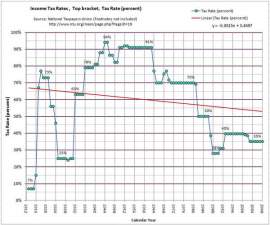
Countercyclical Taxes at a Glance

The cyclical system of the state and local government income taxes is the most specialized means of rendering income taxes fair for taxpayers. The percentage of income deducted from someone's wages at the state level ebbs and flows with the boom and bust of the business cycle. All cyclical taxes follow the mathematical law of direct proportions. This is a fiscal policy that lawmakers may choose to stimulate revenue flow and market demand. The income tax is considered cyclical because state and local income tax revenues are lower during a recession period. Lawmakers can choose a countercyclical fiscal policy to stagger inflation and intervene in the economy. Property taxes are not considered cyclical because real estate is considered an inelastic commodity.
If a countercyclical tax policy is chosen, state income taxes are generally
raised during recessions because states do not wish to cut vital government
services. By nature, governments do not like to turn profits and spend whatever
budgetary surpluses, during economic boom periods, on new services. Governments
expect new services to be perpetual. As a new service becomes older, it becomes
more popular. Therefore, the political ramifications of cutting services
becomes politically unpopular as well. If a state legislature chooses to adopt
countercyclical fiscal policy, they are more likely to cut services. However,
this poses a political dilemma because neither raising taxes nor cutting
services is ever popular. Therefore, law makers constantly manipulate cyclical taxes,
like the income tax, in accordance with the business cycle.
Countercyclical fiscal policies also apply to economic boom periods. As the
economy booms, taxes decrease for everyone because there is enough revenue for
the government to provide its services. Generally, as the economy weakens,
taxes rise as a result of decreased revenue.
Law makers further manipulate cyclical income taxes by making them progressive or regressive. Changing the progressiveness or
regressiveness of income taxes is like shifting a car into lower gear while stuck
in a ditch or keeping it in high gear when cruising. Depending on political
philosophy, income taxes may go in either direction. One thing is for sure,
countercyclical fiscal policy changes in accordance with the business cycle.
These fiscal policy changes generally depend on who the public blames for
economic decline. Lawmakers are constantly gauging how the public reacts to
countercyclical fiscal policies in economic turmoil because these moves may be
politically risky. If the public blames the rich for economic meltdown in
a historically regressive income tax climate; the income tax becomes more
progressive. The opposite is also applicable. During economic boom, the
progressiveness or regressiveness kept as the status quo of income taxes.
Other countercyclical taxes like the sales tax can be manipulated why
increasing the rate in periods of economic crisis in a state, county, city or
town. Tolls may also be raised to preserve vital government services. The
extent to which rates change depend on the public's reaction to changes in tax
laws.



















